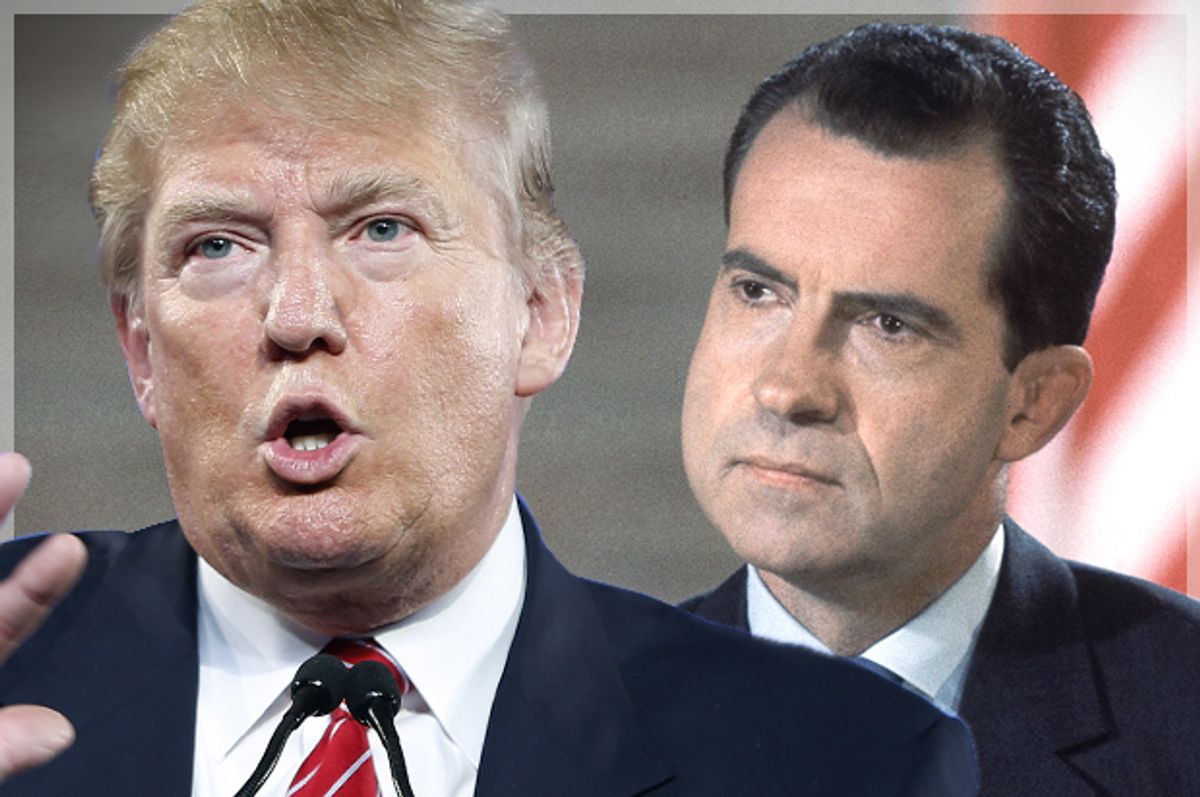As Donald Trump and his subordinates lash out wildly in their campaign to suppress discussion of his presidential campaign's alleged collusion with the Kremlin, they conjure visions of a truly monumental scandal. With their latest attempts to manipulate the FBI and intimidate the Washington press corps, they clumsily encourage comparisons with Watergate—although, as usual with this crew, it isn't so simple to distinguish malevolence from incompetence.
Both the New York Times and CNN clearly struck a sensitive nerve with reports that the FBI is investigating the multiple contacts last year between Russian officials and the Trump campaign. Whatever the nature of those contacts and officials, those stories fit neatly into the long-developing narrative of an illicit effort by Kremlin operatives to sway our presidential election on Trump's behalf through email hacking, fake news reports and hired internet trolls among other things.
If the Russian hacking story was troubling for Trump, it was not nearly as dangerous as the possible collusion of Trump aides and advisers in that conspiracy. While no direct evidence of such collusion has emerged, the implication was inescapable.
The reactions of Reince Priebus, the White House chief of staff, press secretary Sean Spicer, chief strategist Steve Bannon and Trump himself were all telling. After denying the Times story on "Meet the Press," Priebus asked a top FBI official to support that denial—a request the bureau properly rejected because its probe is still continuing. Spicer attacked the stories from the press podium and then, in an extraordinary measure, excluded the Times, CNN and several other news organizations from a briefing in his office. Bannon, in a rare public appearance at the Conservative Political Action Conference, proclaimed a permanent war against the independent press, warning "it's going to get worse every day for the media."
As for Trump, he responded with incoherent and contradictory complaints—raking the "enemy" media in a speech for inventing the Russia stories, and blasting his own FBI in a Twitter tantrum for failing to apprehend the "leakers" within the bureau who presumably had leaked those stories. Of course, a leaked story and a fabricated story are very different: a leak is based on facts, while a fabrication is based on..."alternative" facts.
None of what we have seen so far is Watergate, but the echoes are growing louder and stranger. Nixon oversaw an elaborate campaign of pressure and interference with the FBI investigation, which ultimately became a major element in the impeachment brief against him. Nixon and his team pushed back hard against the press, including a public crusade by Vice President Spiro Agnew and an infamous episode when the Washington Post's Carl Bernstein called Attorney General John Mitchell to ask about a slush fund used by the Committee to Re-elect the President for intelligence operations against the Democrats.
Threatening the Post's publisher, Mitchell screamed, "All that crap, you're putting it in the paper? It's all been denied. Katie Graham's gonna get her tit caught in a big fat wringer if that's published." (It was published, it was true, and "Mr. Law and Order" Mitchell eventually went to prison.)
Do Trump and his associates have something to hide, something even bigger and uglier than Watergate? The ferocity of their reactions certainly arouses suspicion, and so did their peculiar efforts to conceal the misconduct of fired national security adviser Michael Flynn, which they attempted to hide even from the hapless vice president. Had the damning facts about Flynn not leaked, the compromised adviser would still be running the National Security Council, according to Trump.
We may never know the full truth, unless and until the Senate appoints a special investigative committee, and Attorney General Jeff Sessions recuses his conflicted self to appoint a special counsel. For now, unfortunately, Trump can rely on the protection of most Republicans on Capitol Hill, whose interpretation of their duty is so craven and self-serving, unlike the Republican leaders who rose to the challenge of Watergate.
Indeed, all too many Republicans seem ready to celebrate the Kremlin's violation of our democracy. At CPAC, dozens of fervent "conservatives" waved little Russian Federation flags sporting a Trump logo, until conference officials confiscated them.
But that bizarre display didn't reflect the attitude of most Americans. And we can hope that this administration's attempts to bully the press corps will not only fail, but backfire—vindicating the First Amendment, just as in Nixon's time.




Shares